Introduction:
Cloud-Based Cameras are a type of security camera that allow users to remotely access and store surveillance footage in the cloud. These cameras can be accessed from anywhere with an internet connection, allowing for 24/7 surveillance and providing users with peace of mind. Cloud-based CCTV cameras can be used in a variety of settings, including homes, businesses, public spaces, and transportation hubs. They are easy to set up, cost-effective, and can be easily scaled to meet the needs of the user. Some of the key features of cloud-based CCTV cameras include high-definition video, night vision, facial recognition, and analytics. Overall, cloud-based CCTV cameras offer a powerful tool for enhancing security and safety in a variety of settings.

Uses Cloud-based CCTV cameras:
- Home security: Cloud-based CCTV cameras can be used to monitor your home while you’re away, providing 24/7 surveillance and deterring potential intruders.
- Business security: Cloud-based CCTV cameras can be used to monitor your business premises, whether it’s a retail store, warehouse, or office, helping to prevent theft, vandalism, and other security issues.
- Public safety: Cloud-based CCTV cameras can be used in public spaces such as parks, streets, and transportation hubs, helping to improve public safety and reduce crime.
- Traffic monitoring: Cloud-based CCTV cameras can be used to monitor traffic flow and detect accidents or traffic violations.
Advantages:
In recent years, the rapid advancements in cloud computing and artificial intelligence (AI) have led to the development of innovative products, including cloud-based cameras. These cameras leverage cloud computing technology to provide advanced analytics and AI capabilities, revolutionizing the way we think about security and surveillance.
One of the key benefits of cloud-based cameras is that they can be easily integrated with various cloud platforms, allowing for seamless data transfer and real-time analytics. This means that the cameras can analyze video footage in real-time, identify patterns, and generate alerts based on predetermined criteria. For example, if a person enters a restricted area, the camera can immediately send an alert to the security team, allowing them to take immediate action.
Another advantage of cloud-based cameras is that they can be easily accessed from anywhere in the world. With the use of a simple web interface or mobile app, users can access live and recorded footage from the cloud, making it possible to monitor multiple sites and locations from a single interface.
In addition to their real-time analytics and remote access capabilities, cloud-based cameras can also leverage the power of AI to provide advanced features such as facial recognition, object detection, and behavior analysis. These features enable the camera to identify specific individuals or objects and track their movements over time. This can be particularly useful for businesses and organizations that need to monitor large crowds or keep track of people and assets in real-time.
Features:
- High-definition video: Cloud-based CCTV cameras can capture high-definition video footage, making it easier to identify people and objects in the footage.
- Night vision: Some cloud-based CCTV cameras have infrared sensors that allow them to capture clear footage in low-light or no-light conditions.
- Pan, tilt, and zoom: Some cloud-based CCTV cameras have motorized features that allow them to pan, tilt, and zoom, giving you a wider view of the area being monitored.
- Facial recognition: Some cloud-based CCTV cameras have facial recognition technology, allowing you to identify individuals who appear in the footage.
- Analytics: Cloud-based CCTV cameras can analyze footage and generate reports on things like traffic flow, customer behavior, and security threats.
Benefits:
- Remote access: Cloud-based CCTV cameras allow you to access live footage from anywhere with an internet connection, using your smartphone, tablet, or computer.
- Easy setup: Cloud-based CCTV cameras can be set up quickly and easily, without the need for complicated wiring or installation.
- Motion detection: Cloud-based CCTV cameras can detect motion and send notifications to your smartphone, alerting you to any activity in your home or business.
- Scalability: Cloud-based CCTV cameras can be easily scaled up or down to meet your needs, allowing you to add or remove cameras as needed.
- Cloud storage: Cloud-based CCTV cameras can store footage in the cloud, making it easy to access and review footage from anywhere, without the need for physical storage devices.
- Cost-effective: Cloud-based CCTV cameras can be more cost-effective than traditional CCTV systems, as they don’t require as much hardware or maintenance.
Conclusion:
Overall, the use of cloud-based cameras is helping the analytics and AI world to grow faster by providing access to vast amounts of data and enabling advanced analytics and AI capabilities. As cloud technology continues to evolve, we can expect to see even more innovative products and services that leverage the power of the cloud to transform the way we live and work.
